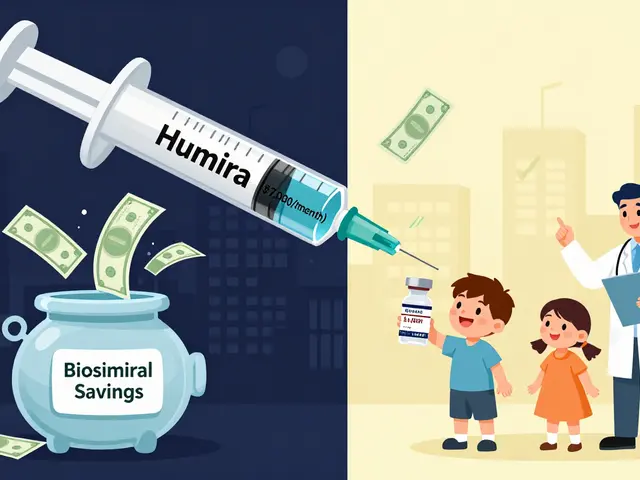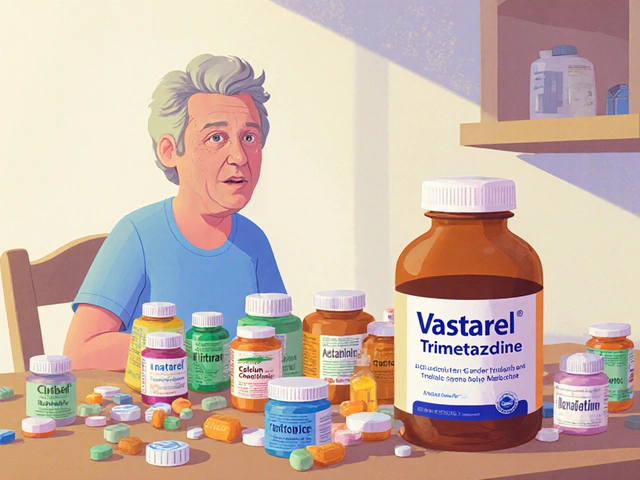Understanding Endometriosis
Endometriosis is a condition that affects millions of women worldwide, yet it is often misunderstood or misdiagnosed. In simple terms, endometriosis is a condition where the tissue that lines the uterus, called the endometrium, grows outside of the uterus. This misplaced tissue can cause a range of symptoms, from pain and discomfort to infertility. It’s important to understand that endometriosis isn't just about having painful periods. It’s a complex and chronic condition that can affect every aspect of a woman's life.
The Link Between Endometriosis and Ovulation
One of the key ways that endometriosis can affect a woman's life is through its impact on ovulation. During a typical menstrual cycle, an egg is released from the ovaries during ovulation. In women with endometriosis, the egg may not be able to travel down the fallopian tubes as it normally would. This can lead to difficulties in getting pregnant. Furthermore, the inflammation and scarring caused by endometriosis can disrupt the normal hormonal signals that trigger ovulation, leading to irregular or even absent ovulation.
Endometriosis and the Menstrual Cycle
Endometriosis can also have a significant impact on the menstrual cycle. Many women with endometriosis experience heavy and painful periods. The misplaced endometrial tissue continues to act as it would in the uterus, thickening and shedding each month. However, because this tissue is outside the uterus, it has no way to leave the body. This can cause painful cramps, heavy bleeding, and other symptoms that can greatly impact a woman's quality of life.
The Role of Hormones in Endometriosis
Hormones play a critical role in the development and progression of endometriosis. The endometrium, whether it's inside or outside the uterus, is responsive to the hormones estrogen and progesterone. These hormones trigger the thickening and shedding of the endometrium each month. With endometriosis, these hormonal changes can lead to inflammation, pain, and the formation of scar tissue. Understanding the role of hormones in endometriosis can help in finding effective treatments for the condition.
Diagnosing Endometriosis
Diagnosing endometriosis can be a complex process. There is no single test that can definitively diagnose the condition. Instead, doctors often use a combination of physical exams, medical history, imaging tests, and sometimes surgical procedures to diagnose endometriosis. Despite the challenges in diagnosis, it's important to seek help if you are experiencing symptoms of endometriosis. Early diagnosis and treatment can help to manage symptoms and improve quality of life.
Treatment Options for Endometriosis
While there is currently no cure for endometriosis, there are several treatment options available to help manage the symptoms. These may include hormonal therapies, pain management strategies, and in some cases, surgery. The best treatment plan will depend on several factors, including the severity of the symptoms, the location and extent of the endometriosis, and whether or not the woman wants to become pregnant in the future.
The Impact of Endometriosis on Fertility
One of the most significant ways that endometriosis can impact a woman's life is through its effect on fertility. Many women with endometriosis have difficulty getting pregnant. The inflammation and scar tissue caused by endometriosis can interfere with the normal movement of eggs and sperm, making conception more difficult. However, it's important to remember that not all women with endometriosis will experience infertility. There are many treatment options available that can help to improve fertility in women with endometriosis.
Coping Strategies for Living with Endometriosis
Living with endometriosis can be challenging, but there are many strategies that can help to manage symptoms and improve quality of life. These may include lifestyle changes, such as maintaining a healthy diet and regular exercise, as well as psychological support, such as counselling or support groups. It's also important to work closely with your healthcare team to develop a comprehensive treatment plan that suits your individual needs.
The Psychological Impact of Endometriosis
The impact of endometriosis isn't just physical. This condition can also have a significant psychological impact, leading to feelings of frustration, isolation, and depression. It's important to acknowledge and address these feelings. Seeking support from a mental health professional, joining a support group, or just talking openly about your experiences with friends and family can all be helpful in managing the psychological impact of endometriosis.
Endometriosis: A Lifelong Journey
Living with endometriosis is a lifelong journey. It's a condition that can have a significant impact on a woman's life, affecting everything from her menstrual cycle to her fertility to her emotional well-being. However, with the right support and treatment, women with endometriosis can lead full and healthy lives. Remember, you are not alone in this journey. Reach out to others, seek help when you need it, and take care of yourself. Your health and well-being are worth it.






Endometriosis really messes with the whole cycle, huh? I’ve read that the inflammatory environment can throw off the hormonal cues that trigger ovulation, which explains the irregular periods many of us face. It’s also why some women end up with scar tissue that blocks the egg’s path to the fallopian tubes. The article does a solid job breaking down the hormone part, especially estrogen’s role in feeding the ectopic tissue. Bottom line: understanding the biology is the first step toward smarter treatment choices.
Totally agree, it’s wild.
The connection between chronic inflammation and reproductive function is a classic example of how systemic issues manifest locally. When the endometrial implants trigger immune responses, they can alter the feedback loop of the hypothalamic‑pituitary‑ovarian axis. This disruption may lead to anovulatory cycles or luteal phase defects. It reminds us that treating endometriosis often requires a holistic approach beyond just pain relief.
Endometriosis is more than just a painful period; it’s a full‑blown hormonal rollercoaster. From the moment the ectopic tissue starts secreting estrogen, it hijacks the normal menstrual signaling. The extra estrogen can suppress the natural rise of progesterone that’s needed after ovulation. Without proper progesterone support, the lining of the uterus can become unstable, leading to heavier bleeding. Meanwhile, inflammatory cytokines like IL‑6 and TNF‑α create a hostile environment for the egg. These molecules can impair the fimbrial function of the fallopian tubes, making it harder for the egg to be captured. Scar tissue that forms around the ovaries can physically block the release or pickup of the egg. Patients often report irregular cycles, which aligns with the erratic hormonal feedback loops you see in labs. Medical imaging sometimes misses subtle adhesions that are the real culprits behind infertility. Surgical removal of implants can restore normal anatomy, but hormones often stay out of balance. That’s why many doctors combine laparoscopic excision with hormonal therapies like GnRH agonists. These drugs intentionally shut down estrogen production, giving the body a chance to reset. However, the side effects can be tough-hot flashes, bone loss, and mood swings are common. Lifestyle changes such as a low‑inflammatory diet and regular moderate exercise can also tip the scales. Stress management is crucial because cortisol can further disrupt the hypothalamic‑pituitary axis. In the end, a multidisciplinary plan that addresses both the physical lesions and the hormonal milieu offers the best hope for regaining regular ovulation and a smoother cycle.
I feel you, it’s a lot.
The discourse surrounding endometriosis often suffers from a lamentable paucity of rigor. While the article enumerates pathophysiological mechanisms, it fails to contextualize them within the broader evo‑developmental framework. One must consider the epigenetic imprinting that predisposes ectopic implantation. Moreover, the therapeutic algorithms presented are curiously devoid of cost‑effectiveness analyses.
Hey, great rundown! I love how the piece breaks down the hormone drama without getting all science‑y. If you’re dealing with this, remember you’re not alone – there are support groups that actually help. Keep pushing for the right doc, and don’t forget to treat yourself on the good days.
Thanks for the heads‑up, Halle. I’ve actually joined a local circle and they’ve been a lifeline when the pain spikes. Sharing stories makes the whole journey feel a bit less isolating. Also, a gentle reminder to track your cycles; it can reveal patterns that your doctor might miss.
Endometriosis is real. It hurts a lot. Hormones are messed up. Scars block eggs. Treatment is tough. Stay strong.
Your succinct articulation of the condition is commendable. Nonetheless, one must not underestimate the psychosocial ramifications inherent to chronic gynecological disorders. It would behoove the readership to consider interdisciplinary management, encompassing both somatic and mental health strategies. I trust this perspective augments the existing discourse.
Reading this feels like a warm hug for anyone who’s been told “it’s just cramps.” The way you laid out the hormonal dance, the pain, and the emotional rollercoaster is both honest and hopeful. I’ve walked that tightrope myself, and I can say that finding a doctor who gets the full picture changed everything. Keep shining a light on the hidden struggles, because visibility is the first step to empowerment.
Well said! I think the mainstream media ignores the real agenda behind all the “research”. Stay woke.
Honestly, I think most of these articles over‑hyping endometriosis just to sell supplements. Sure, some folks suffer, but the panic around every missed period is ridiculous. People need to chill and stop blaming every mood swing on “hormonal chaos”. And don’t even get me started on all the “miracle” diets – they’re a scam.
Whoa, Marilyn! You’re missing the point – the pain is real and the stigma is brutal. I’ve seen countless friends battle daily, and the support they get from genuine info saves lives. Let’s keep the conversation respectful and focus on evidence‑based help.
Oh great, another “miracle cure” that promises to banish endometriosis with a single avocado toast. If only it were that easy, we’d all be dancing in the kitchen. In reality, you need a solid treatment plan, not hype.
Sure thing, Alex. Everyone’s got their own take.
Listen up, folks: endometriosis isn’t a trendy buzzword, it’s a serious medical condition that demands proper diagnosis and treatment. Stop sharing half‑baked anecdotes and start consulting certified specialists. Your health isn’t a joke.
Totally agree, Sarah. Got my doc on board and we’re crushing it with meds and yoga. Keep grinding!
In summary, a multidisciplinary approach remains the gold standard for managing endometriosis-related ovulatory and menstrual disturbances.